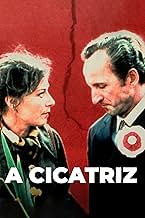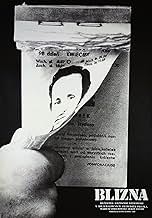CALIFICACIÓN DE IMDb
6.6/10
2.3 k
TU CALIFICACIÓN
Tras discusiones y negociaciones deshonestas, se decide el lugar de construcción de una nueva fábrica de químicos.Tras discusiones y negociaciones deshonestas, se decide el lugar de construcción de una nueva fábrica de químicos.Tras discusiones y negociaciones deshonestas, se decide el lugar de construcción de una nueva fábrica de químicos.
- Premios
- 2 premios ganados y 1 nominación en total
Agnieszka Holland
- Hania
- (as A. Holland)
Malgorzata Lesniewska
- Malgosia
- (as M. Lesniewska)
Asja Lamtiugina
- Olecko Resident
- (as A. Lamtiugina)
Ryszard Bacciarelli
- Architect
- (as R. Bacciarelli)
Bohdan Ejmont
- Participant at the Chairman's Meeting
- (as B. Ejmont)
Henryk Hunko
- Olecko Resident
- (as H. Hunko)
Argumento
¿Sabías que…?
- TriviaFirst ever theatrical film directed by Krzysztof Kieslowski.
- Citas
Stefan Bednarz: That's no way to live. You have to figure out what you want.
Stefan's Daughter: Is your life the way to live? A new job and home and friends every five years? I don't know. You've left Mom on her own. Is that a way to live?
- ConexionesEdited into Klaps (1976)
Opinión destacada
Krzysztof Kieslowski became a highly appreciated art-house director in Europe when he made his TV-series about The Ten Commandments, "Dekalog" (1989). Later on, in the 1990's he directed The Double Life of Veronique and The Three Colours trilogy, which confirmed his position in the international art-house. As most filmmakers do so did he start by making documentaries, then he made two films for the Polish television and after that his first film for the big screen, Blizna (The Scar, 1976).
Kieslowski himself called the film horrible. He criticized its screenplay and categorized the film as socialist realism. He probably saw something I can never be able to see; something that only the one who made the film could see. Blizna is a realistic film about a socialist society, but socialist realism was never even close to realism. It's full of that blind optimism which Stalin so idealized. But Kieslowski's film, Blizna, is incredibly pessimistic: it shows how socialism works, how it doesn't work, how it cannot work and how it's impossible for anyone to make a change in a society like that. However, one shouldn't feel that Kieslowski was a man cheering for individualism, market economy or economic liberalism. He always called himself unpolitical and criticism for the new, capitalist Poland can be seen in his later film Three Colors: White (1993).
Blizna is a story about a corporation which decides to build a new factory in spite of ecology, or the people living in the area. They choose a man with a family to lead the project. Quickly he reveals to be a man who takes responsibility and tries to finish the project with honor. He soon starts to see the flaws of the project, where moral is only one defect. In his journey through Machiavellist politics he finds making a change incredibly difficult.
The authorities of Poland didn't ban Blizna, but they treated it badly, and basically no one saw it until the producer of The Three Colours trilogy brought a bunch of films from Kieslowski's early career to the screen. Having seen Blizna today, it might have partly lost its grip, since it is tightly tied to its own time. The 1970's can be seen in just about everything: in the style, in the narrative, in the dialog and in the costumes. This isn't a bad thing, by any means, but Blizna certainly isn't a timeless classic. But what it is, is a good description of it's time. It shows how Poland worked in the 1970's under the socialist government; how it did not worked. Kieslowski said in his interview book, Kieslowski on Kieslowski by Danusia Stok, how sad it is that no one takes responsibility on what happened during the era -- not even today.
Blizna is very pessimistic and has got inconsolable despair. It shows how impossible it was to make a change in Poland and how hopeless the era was. To put it briefly, it's a satirical description of the authorities of Poland. It is funny, political, pessimistic and very interesting for those who love Kieslowski, European art-house or are interested in history of the 20th century.
Kieslowski himself called the film horrible. He criticized its screenplay and categorized the film as socialist realism. He probably saw something I can never be able to see; something that only the one who made the film could see. Blizna is a realistic film about a socialist society, but socialist realism was never even close to realism. It's full of that blind optimism which Stalin so idealized. But Kieslowski's film, Blizna, is incredibly pessimistic: it shows how socialism works, how it doesn't work, how it cannot work and how it's impossible for anyone to make a change in a society like that. However, one shouldn't feel that Kieslowski was a man cheering for individualism, market economy or economic liberalism. He always called himself unpolitical and criticism for the new, capitalist Poland can be seen in his later film Three Colors: White (1993).
Blizna is a story about a corporation which decides to build a new factory in spite of ecology, or the people living in the area. They choose a man with a family to lead the project. Quickly he reveals to be a man who takes responsibility and tries to finish the project with honor. He soon starts to see the flaws of the project, where moral is only one defect. In his journey through Machiavellist politics he finds making a change incredibly difficult.
The authorities of Poland didn't ban Blizna, but they treated it badly, and basically no one saw it until the producer of The Three Colours trilogy brought a bunch of films from Kieslowski's early career to the screen. Having seen Blizna today, it might have partly lost its grip, since it is tightly tied to its own time. The 1970's can be seen in just about everything: in the style, in the narrative, in the dialog and in the costumes. This isn't a bad thing, by any means, but Blizna certainly isn't a timeless classic. But what it is, is a good description of it's time. It shows how Poland worked in the 1970's under the socialist government; how it did not worked. Kieslowski said in his interview book, Kieslowski on Kieslowski by Danusia Stok, how sad it is that no one takes responsibility on what happened during the era -- not even today.
Blizna is very pessimistic and has got inconsolable despair. It shows how impossible it was to make a change in Poland and how hopeless the era was. To put it briefly, it's a satirical description of the authorities of Poland. It is funny, political, pessimistic and very interesting for those who love Kieslowski, European art-house or are interested in history of the 20th century.
- ilpohirvonen
- 22 jul 2010
- Enlace permanente
Selecciones populares
Inicia sesión para calificar y agrega a la lista de videos para obtener recomendaciones personalizadas
- How long is The Scar?Con tecnología de Alexa
Detalles
Contribuir a esta página
Sugiere una edición o agrega el contenido que falta

Principales brechas de datos
By what name was La cicatriz (1976) officially released in India in English?
Responda
































